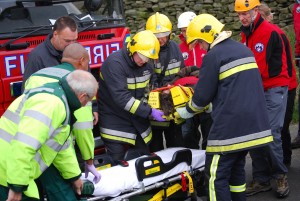Casualty Care is the Priority
The weekend of 12th December 2008 saw another fourteen members of Buxton Mountain Rescue Team and six members from Glossop and Kinder teams undertake a stern examination in advanced first aid. The course syllabus and examination 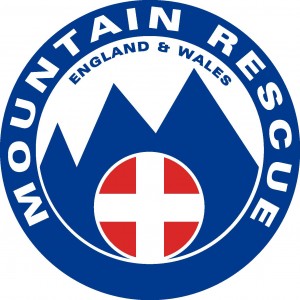 are set by our national umbrella body Mountain Rescue England and Wales; Mountain Rescue Scotland also shares the same examination so, from the summits of Glen Coe to the limestone dales of the Peak, all casualties should receive the same high quality of care.
are set by our national umbrella body Mountain Rescue England and Wales; Mountain Rescue Scotland also shares the same examination so, from the summits of Glen Coe to the limestone dales of the Peak, all casualties should receive the same high quality of care.
The examination comprises a one hour written test followed by two twenty-minute practical tests which are overseen by independent doctors. The practicals involve the use of the team’s first aid equipment and may include the use of a Cardiac Defibrillator, the administration of medical gases or intra-muscular injection of analgesics. Prior to th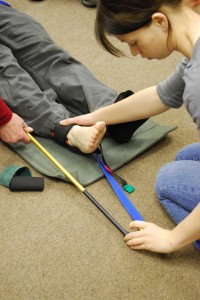 e examination each team member will have undertaken an in-depth training course spanning many months and covering every aspect of the injuries and illnesses likely to be encountered on a team call-out. Lower leg and ankle injuries are the most common problems the team has to deal with but very serious injuries can be encountered when we are called to a rock-climbing or paragliding accident.
e examination each team member will have undertaken an in-depth training course spanning many months and covering every aspect of the injuries and illnesses likely to be encountered on a team call-out. Lower leg and ankle injuries are the most common problems the team has to deal with but very serious injuries can be encountered when we are called to a rock-climbing or paragliding accident. 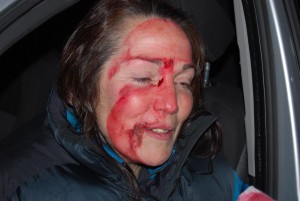 Training starts in the classroom with lectures from the team doctors and first aid instructors. Outside guests from East Midlands Ambulance Service often help with specialist advice. Basic bandaging and splinting soon moves on to how to recognise and deal with medical ailments such as cardiac problems and Hypoglycemia. Later comes the practical training during outside exercises in poor weather and darkness. The aim is always to promote the best recovery possible and to be able to hand a casualty over to the professionals knowing that everything possible has been done to treat their condition and reduce their suffering.
Training starts in the classroom with lectures from the team doctors and first aid instructors. Outside guests from East Midlands Ambulance Service often help with specialist advice. Basic bandaging and splinting soon moves on to how to recognise and deal with medical ailments such as cardiac problems and Hypoglycemia. Later comes the practical training during outside exercises in poor weather and darkness. The aim is always to promote the best recovery possible and to be able to hand a casualty over to the professionals knowing that everything possible has been done to treat their condition and reduce their suffering. 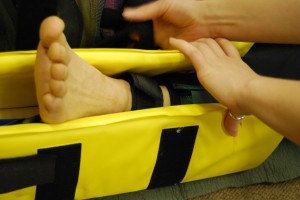
It is because team members are volunteer amateurs that the training has to be very thorough and has to be repeated time and time again to make up for the lack of practical experience gained in the professional medical services. Being volunteers is never seen as an excuse to offer anything less than would be expected from the professionals, and ongoing training, examination and re-examination ensures that the highest standards are maintained. First Aid takes up over 50% of the team’s annual training programme. All operational team members must have a basic first aid qualification which includes life support training and the use of a Defibrillator and medical gasses. Over 80% of members then move up to the national Mountain Rescue Casualty Care Certificate standard. Training so many to such a standard is a major commitment for students and teachers and it could not be achieved without the total dedication of so many willing volunteers. If you have medical qualifications and think you could help with team training please get in to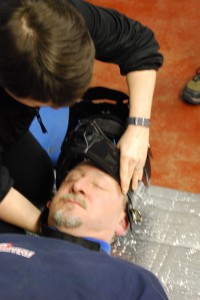 uch.
uch.
Above. Dealing with leg injuries in the classroom
Left. Learning how to safely remove a mountain biker’s crash helmet.
Below. When the casualty is off the hill the team can hand over to the professionals. Its all about team work, confidence and respect.